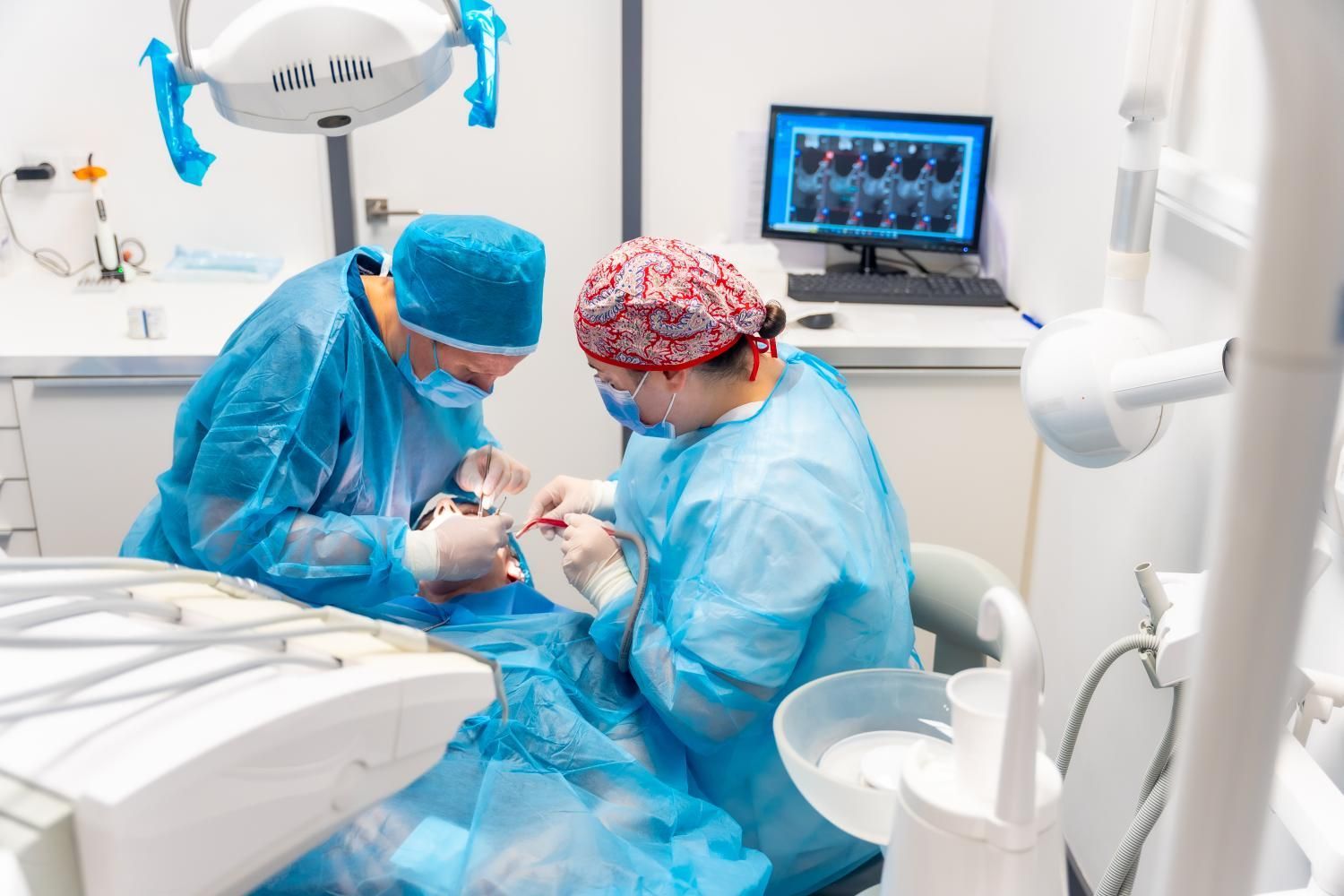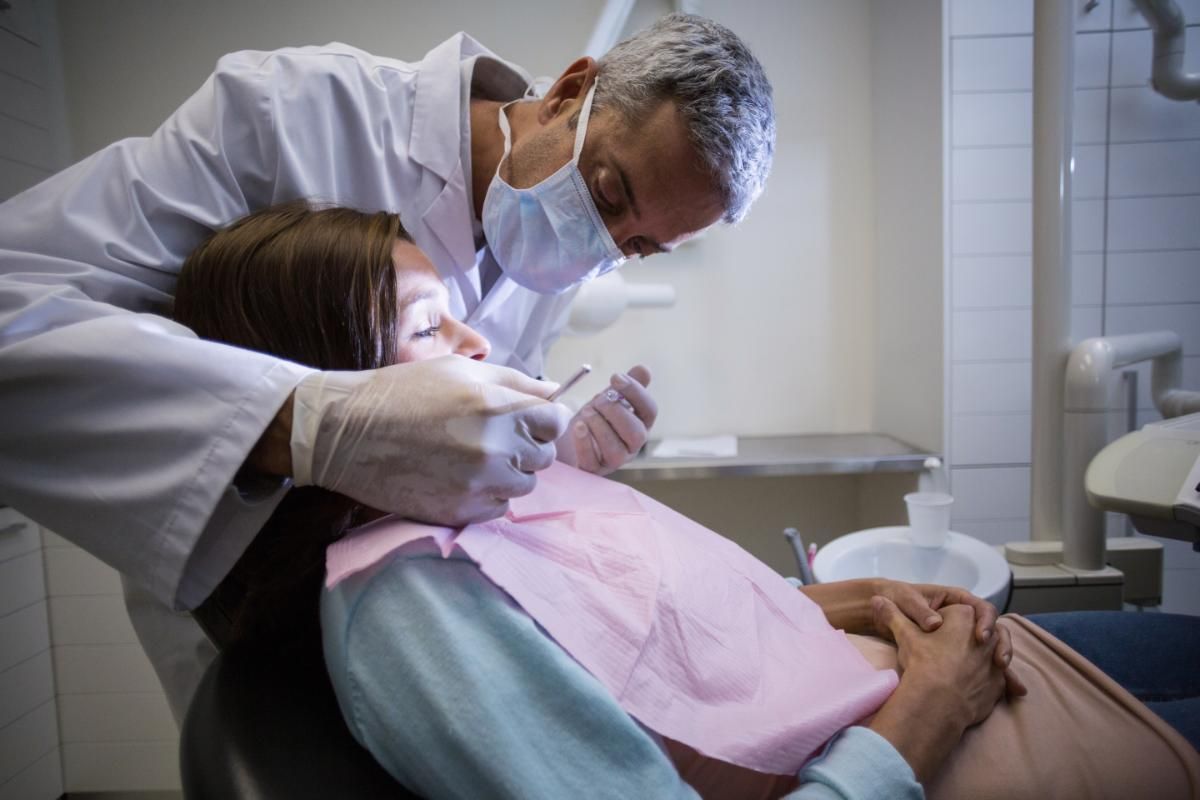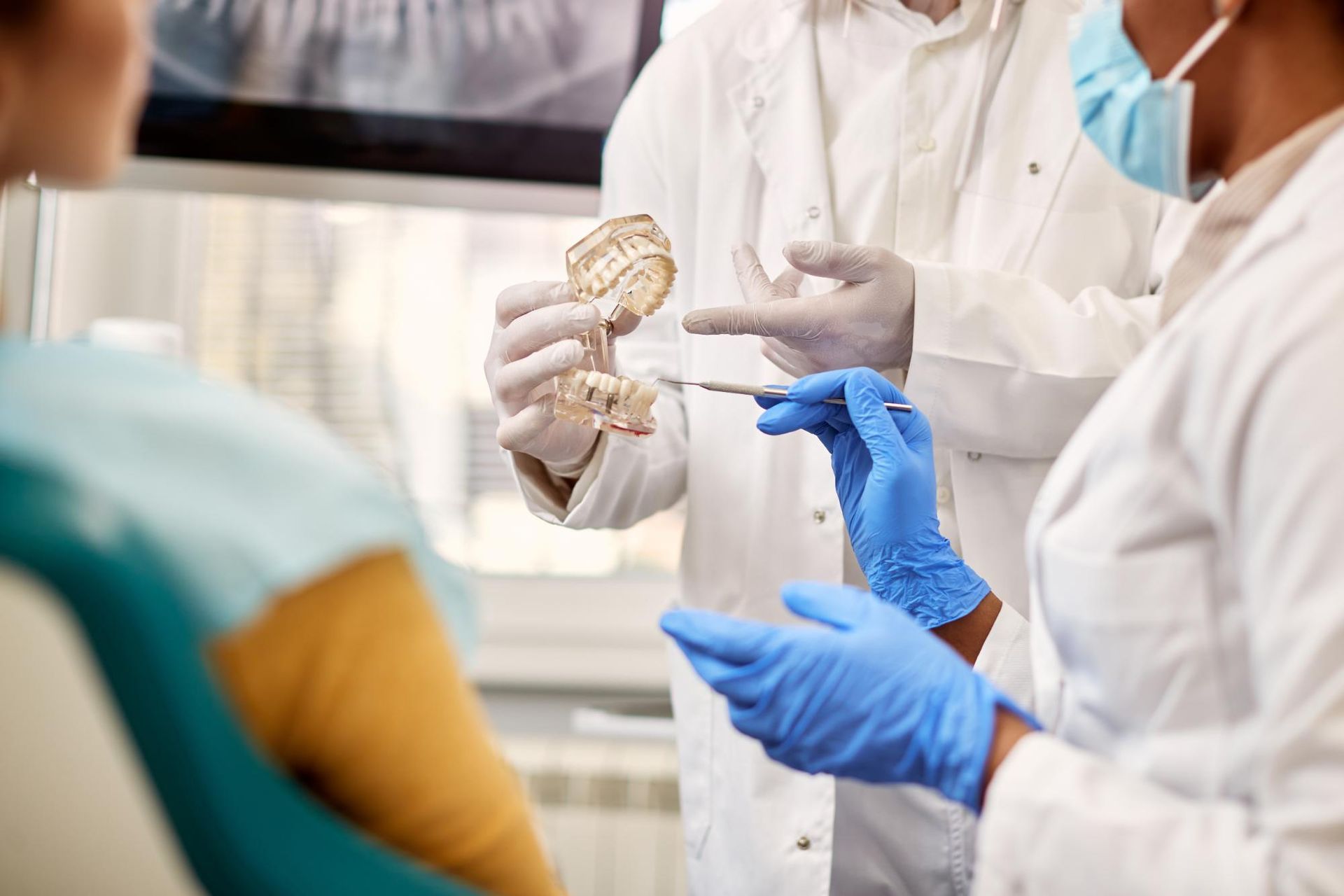Contact Information
smiles@mylakesidedentist.com
15400 19 Mile Rd, Clinton Twp, MI 48038, United States of America
Serving Clinton Township and Surrounding Areas
info@mylakesidedentist.com
(586) 228-0909
Top Solutions for Emergency Tooth Surgery | Swift & Reliable Care
17 Minute Read
In severe dental pain or have a broken tooth? Emergency tooth surgery can help. This guide explains what happens during emergency tooth surgery, how to find urgent care, and what you can expect during recovery.
Key Takeaways
- Emergency tooth surgery addresses urgent dental issues like severe tooth decay, abscesses, and traumatic injuries, requiring immediate care to prevent complications.
- Access to same-day emergency dental appointments and walk-in clinics ensures timely treatment, helping to alleviate severe pain and restore oral health.
- Post-operative care and effective pain management are crucial for recovery after emergency tooth surgery, with detailed instructions provided to patients to minimize complications.
Top Solutions for Emergency Tooth Surgery | Swift & Reliable Care

When faced with a dental emergency, finding an emergency dentist who can provide immediate relief becomes a top priority. Severe toothache pain can be debilitating, often caused by various dental issues such as decay, infection, or trauma. Emergency dental services are designed to offer quick and efficient solutions, from emergency tooth extractions to urgent root canal therapies.
Emergency tooth extractions are often necessary when a tooth is severely damaged or infected and cannot be saved. The focus during these procedures is to provide swift relief, preventing further complications and restoring oral health. Facilities like walk-in dental clinics allow patients to receive immediate attention without needing a scheduled appointment, ensuring that urgent dental care is accessible when it’s needed most.
For those experiencing a broken tooth or severe toothache pain, same-day emergency appointments with experienced oral surgeons can be a lifesaver. These professionals are equipped to handle complex cases, including jaw fractures or dislocations, ensuring that patients receive the highest standard of care during emergency extractions. Post-treatment follow-up is also essential to ensure optimal healing and patient satisfaction.
Introduction
Dental emergencies have a way of catching us off guard. Whether it’s an unexpected severe toothache, a knocked-out tooth, or a broken tooth, these urgent scenarios demand immediate attention. The unexpected nature of dental emergencies emphasizes the importance of knowing where to turn for help and understanding the available solutions.
When faced with a dental emergency, having access to prompt and reliable dental care can make all the difference. This guide will walk you through the various aspects of emergency tooth surgery, from identifying common causes to understanding the surgical process and post-operative care. This guide aims to equip you with the confidence and knowledge to handle dental emergencies effectively.
What Is Emergency Tooth Surgery?

Emergency tooth surgery encompasses a range of urgent dental procedures aimed at alleviating severe pain and addressing critical dental issues. These procedures include emergency tooth extractions, where a severely damaged or infected tooth is removed to prevent further complications. Emergency dental services are crucial in providing immediate care for situations like severe tooth decay, abscessed teeth, and traumatic injuries.
Emergency dentists and oral surgeons play pivotal roles in this process. They are trained to handle various dental emergencies, from repairing damaged dental restorations to addressing jaw fractures or dislocations. Same-day emergency appointments are vital for urgent cosmetic and functional restoration, ensuring that patients receive the immediate care they need from emergency services.
Prompt action is essential to prevent further damage and restore oral health effectively.
Common Reasons for Emergency Tooth Surgery
Several urgent dental conditions can necessitate emergency tooth surgery. Understanding these common reasons helps in recognizing when to seek immediate care. Severe tooth decay, abscessed teeth, and traumatic injuries are among the primary causes that lead to emergency tooth extractions and other urgent dental procedures.
Severe Tooth Decay
Severe tooth decay is a prevalent issue that can lead to significant complications if not addressed promptly. Symptoms such as persistent toothaches and swelling in the gums indicate that the decay has reached an advanced stage. When decay reaches the tooth’s pulp, the resulting extreme pain and increased risk of infection make emergency intervention necessary.
Emergency dentists can assess the extent of the decay and determine the best course of action. An emergency tooth extraction is often necessary. It helps prevent the infection from spreading and restores oral health. Conditions like pulp necrosis, fractures, and non-restorable decay frequently necessitate this urgent procedure.
Ignoring severe tooth decay can escalate the problem, leading to more pain and potential tooth loss. Therefore, timely treatment is crucial to alleviate pain and prevent further oral health issues. Emergency dental services are equipped to handle these urgent cases efficiently, providing relief and restoring functionality.
Abscessed Tooth
An abscessed tooth is a serious and painful condition that requires immediate attention. This bacterial infection can result from a chipped or broken tooth, gum disease, or worn enamel. The intense pain and swelling associated with an abscessed tooth often necessitate urgent dental care to prevent the infection from spreading.
In certain situations, antibiotics can help treat the infection effectively. Additionally, root canal treatment may also resolve the issue without requiring extraction. However, if the infection is severe, an emergency tooth extraction may be the only solution to alleviate pain and restore oral health. Emergency dentists and oral surgeons are skilled in managing these critical situations, ensuring that patients receive the necessary treatment promptly.
Traumatic Injury
Traumatic injuries to the teeth and mouth are common reasons for emergency tooth surgery. Accidents, sports-related incidents, and other forms of trauma can cause significant dental damage that requires immediate care. These injuries often result in extreme pain, especially if the tooth’s pulp is exposed, necessitating emergency extraction.
Prompt evaluation and treatment by an emergency dentist are crucial to prevent further complications and ensure effective care. If a tooth is beyond repair or poses a risk to oral health, extraction may be required to prevent more severe issues. Immediate care can make a significant difference in the outcome of traumatic dental injuries.
The Emergency Tooth Surgery Process
Understanding the process of emergency tooth surgery can help alleviate some of the anxiety associated with these urgent procedures. This process typically involves an initial assessment, the surgical procedure itself, and essential post-operative care to ensure proper healing and minimize complications.
Initial Assessment
The first step in the emergency tooth extraction process is a thorough oral exam to assess the situation. This includes comprehensive examinations and X-rays to diagnose the problem accurately. During the patient consultation, the emergency dentist explains the procedure, the reasons for extraction, and addresses any concerns the patient might have.
Managing anxiety is also essential during this initial assessment. Techniques such as breathing exercises can help patients feel more at ease and prepared for the extraction process. Ensuring that patients are well-informed and comfortable is a key aspect of providing effective emergency dental care.
Surgical Procedure
During the surgical procedure, a local anesthetic is administered to numb the area, ensuring the patient remains comfortable and free from pain. For more complex cases, such as a broken tooth at the gum line or an unerupted tooth, a surgical extraction may be necessary. This involves creating an opening in the gums and carefully extracting the tooth in pieces to minimize trauma to surrounding tissues.
After the tooth is removed, the area is cleaned, and gauze is applied to control bleeding. The dentist or oral surgeon takes great care to protect surrounding structures and ensure a safe extraction process. Local anesthetics are used throughout to maintain comfort and manage pain effectively.
Post-Operative Care
Post-operative care is crucial for proper healing and minimizing complications after an emergency tooth surgery. Patients receive detailed instructions on managing the extraction site, including pain relief, activity restrictions, and oral hygiene guidelines. Eating soft foods and avoiding smoking or using straws can aid in a smoother recovery.
Monitoring for signs of infection or excessive bleeding is essential. If any issues arise, such as intensifying pain or a fever above 100.4°F, immediate dental attention is necessary. Following the dentist’s instructions carefully ensures optimal healing and reduces the risk of complications.
Pain Management During and After Surgery
Pain management is a critical aspect of emergency tooth surgery. Local anesthetics, such as lidocaine, are commonly used to numb the area around the tooth during extraction, providing effective pain relief. In some cases, general anesthesia may be used for a completely pain-free experience, though it is more costly.
Post-surgery, both non-opioid and opioid analgesics can help manage acute dental discomfort. Taking ibuprofen before the extraction can also reduce pain and inflammation. Staying hydrated and following the dentist’s recommendations for pain management are essential for a comfortable recovery.
Recovery Tips for Post-Surgery
Proper recovery after an emergency tooth surgery is vital for healing. Maintaining steady pressure on a gauze pad over the extraction site helps form a blood clot, which is crucial for healing. Light bleeding may persist for up to 24 hours, and monitoring this is important to ensure proper recovery.
To minimize swelling, applying an ice pack to the outside of the cheek near the extraction site can be beneficial. Eating soft foods and avoiding physical activity for a few days post-surgery can prevent complications and support healing. Gentle oral hygiene practices, such as rinsing with salt water after the first 24 hours, are also important.
When to Seek Immediate Medical Attention
Knowing when to seek immediate medical attention is crucial during a dental emergency. Dental emergencies require prompt action to alleviate pain and prevent further complications. Sudden toothaches, broken teeth, or a knocked-out tooth are signs that you need professional care immediately.
If you experience difficulty breathing or swallowing after a tooth extraction, it indicates the need for urgent care. Signs of infection, such as a foul smell or taste from the extraction site, or a loose or absent blood clot, also warrant immediate dental evaluation.
Persistent numbness or tingling after an extraction may indicate nerve damage and should be reported to a dentist quickly.
Cost of Emergency Tooth Surgery
The cost of emergency tooth surgery can vary depending on the complexity of the procedure. For surgical tooth extractions, patients can expect to pay approximately $225, while a simple extraction may cost around $175. It’s important to verify dental insurance coverage to understand your financial obligations during emergency extractions.
Financing options, such as Care Credit, are available for those needing emergency dental care. Patients can also pay using cash or major credit cards. Consulting with your insurer about coverage for emergency extractions can help manage costs effectively.
Preventing the Need for Emergency Tooth Surgery
Preventing the need for emergency tooth surgery involves maintaining good oral hygiene and regular dental check-ups. Brushing twice daily, flossing once, and using fluoride products can help prevent tooth decay and other issues that lead to extractions. Monitoring your diet to limit sugar intake and staying hydrated are also crucial for oral health.
Regular dental cleanings every six months allow professionals to identify potential problems early and manage them before they escalate. Managing stress to prevent teeth grinding and using fluoride toothpaste and mouth rinse can further strengthen teeth and reduce the risk of decay.
Summary
In summary, understanding the top solutions for emergency tooth surgery and knowing when to seek immediate care can significantly impact the outcome of a dental emergency. From severe tooth decay to traumatic injuries, timely intervention by skilled emergency dentists and oral surgeons is essential for effective treatment and recovery.
By following preventive measures and maintaining regular dental care, you can reduce the likelihood of needing emergency tooth surgery. Staying informed and prepared ensures that you can handle dental emergencies with confidence and receive the best possible care when it matters most.
Frequently Asked Questions
-
What are the most common reasons for emergency tooth surgery?
Emergency tooth surgery is typically necessitated by severe tooth decay, abscessed teeth, or traumatic injuries that cause significant dental damage. Addressing these issues promptly is crucial to prevent further complications.
-
How can I manage pain during and after an emergency tooth extraction?
To effectively manage pain during and after an emergency tooth extraction, local anesthesia is used for the procedure, while post-operative discomfort can be alleviated with both non-opioid and opioid analgesics, along with ibuprofen to reduce inflammation. Following these steps will help ensure your recovery is as comfortable as possible.
-
What should I do if I experience severe pain or complications after surgery?
If you experience severe pain or complications after surgery, seek immediate medical attention from your healthcare provider or an urgent care center. Prompt action is crucial for your well-being.
-
How much does an emergency tooth extraction typically cost?
An emergency tooth extraction typically costs around $175 for a simple procedure and approximately $225 for a surgical extraction. It's advisable to verify coverage details with your dental insurance provider.
-
What steps can I take to prevent the need for emergency tooth surgery?
To prevent the need for emergency tooth surgery, prioritize good oral hygiene, schedule regular dental check-ups, manage your diet, and use fluoride products. Taking these proactive steps can significantly reduce your risk of dental emergencies.








CONTACT US FOR A FREE CONSULTATION
Ready to Take the Next Step Towards a Full, Vibrant smile?
Start your journey towards exceptional dental care. Our mission is to help you unlock your perfect smile and embrace the essence of quality dentistry at its finest.

Contact Information
Request a Free Consultation
For more information about our services or to schedule an appointment, call us at (586) 228-0909 or complete the form below we’ll get back to you as soon as we can.
Our Services
Quick Links
Contact Information
smiles@mylakesidedentist.com
15400 19 Mile Rd Suite 180
Clinton Township, MI 48038
All Rights Reserved | Lakeside Family & Implant Dentistry





